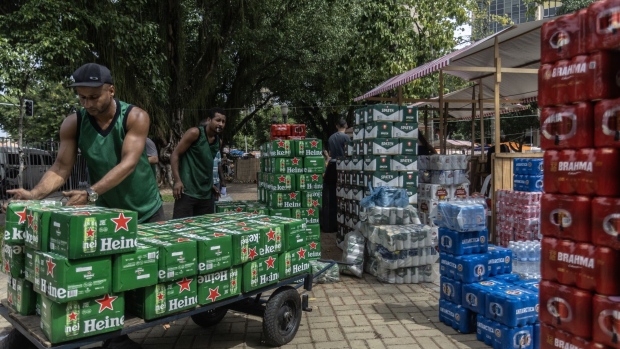Apr 25, 2024
Beer and Booze Battle Over Rates as Brazil Wraps Up Tax Overhaul
, Bloomberg News

(Bloomberg) -- A new “sin tax” is splitting Brazil’s alcoholic beverage industry as beer producers and liquor manufacturers wrangle over how much they should have to pay.
Brazil’s association of beermakers, which represents companies like Ambev SA and Heineken NV, argues they should pay lower rates under the levy meant to limit consumption of goods considered harmful to health or the environment because their products contain less alcohol by volume. But the Brazilian Association of Liquors, which lists Bacardi Ltd., Beam Suntory Inc. and Diageo PLC among its members, has pushed for constant rates across the industry.
The boozy battle highlights the challenges facing Brazil’s efforts to complete the sweeping overhaul of its tax code — one of the world’s most complex — that lawmakers approved last year.
President Luiz Inacio Lula da Silva’s government on Wednesday unveiled the first major regulatory proposal to put the system into place, kicking off a lobbying blitz as the process of setting rules and rates begins in Congress. And although the sin levy is a relatively small piece of the plan that replaces existing consumption charges with value-added taxes, it is likely to generate its most contentious debates, said Heleno Torres, a tax attorney and professor at the University of Sao Paulo.
“Companies need to examine everything carefully for the peculiarities of their industries,” Torres said.
The sin tax will be charged on top of the newly-created VATs, rates for which will average about 26.5%, according to the Finance Ministry.
Read More: Brazil Completes Sweeping Tax Overhaul 30 Years in the Making
Alcoholic beverages are currently taxed at varying rates, with beer producers paying 6%, significantly lower than the 22% levied on wine and 30% to 35% for distilled spirits.
The present rates are unrelated to the amount of alcohol in the drinks, according to Luiz Dias, the coordinator of a group in which Brazilian states debate plans for tax harmonization. But in its proposal, the Finance Ministry said “specific rates” for such products, which will be set in subsequent negotiations, “should consider the alcohol content by volume of the products.”
The sin tax for alcoholic drinks will vary depending on the amount of alcohol in each product and also on the alcoholic grade, according to Bernard Appy, extraordinary secretary for tax reform. “Assuming a liter of whiskey is 40 degrees and a beer is 4 degrees, the liter of whiskey will pay ten times more tax than the liter of beer,” Appy said in a press conference. The new tax will take effect as of 2027
Beer producers have pushed for such a model since the sin tax was approved, arguing that other major countries use similar criteria. They have also pointed to a 2023 report from the World Health Organization that said that beverages with higher concentrations of alcohol should be taxed at higher rates.
“This is the model used in more than 40 countries, including Mexico, Germany, the United States and the United Kingdom,” said Marcio Maciel, the president of the National Beer Industry Union. “This is a public health prioritization with a decades-tested and internationally approved model.”
The Brazilian Association of Liquors, however, has argued that health problems are related to the amount of alcohol consumed, not the percentage-by-volume of specific drinks. It has brandished a report from Brazil’s National Health Council that says that the tax shouldn’t be easier on beer because it is responsible for 90% of alcohol consumption in the country.
“It’s essential to understand that alcohol is alcohol,” said Jose Eduardo Cidade, the association’s chairman. The tax, he said, should be equalized in order to “fulfill its function: mitigate excessive consumption and preserve consumer health.”
The sin tax is expected to generate about 5 billion reais in revenues that will be transferred to states and municipalities, according to Brazil’s federal audit court, although it says it is difficult to provide accurate estimates.
Read More: Brazil’s Credit Rating Upgraded by S&P After Tax Overhaul
While beer and booze wield studies and science, other sectors have turned to more creative arguments to push for lower rates. Supermarket industry representatives this month argued that by exempting products like foie gras, truffles and lobster from taxation, lawmakers could avoid painting specific foods as for “rich or poor.”
The plan also proposed a 60% discount on beer, caviar, chocolate, champagne and wine.
But the government prioritized food consumed primarily by the poorest Brazilians in its proposal, which included a leaner list of products exempt from taxation. It left out many of the items the association requested.
(Updated with company names in the second, comment from the extraordinary secretary for tax reform in the ninth paragraph)
©2024 Bloomberg L.P.


